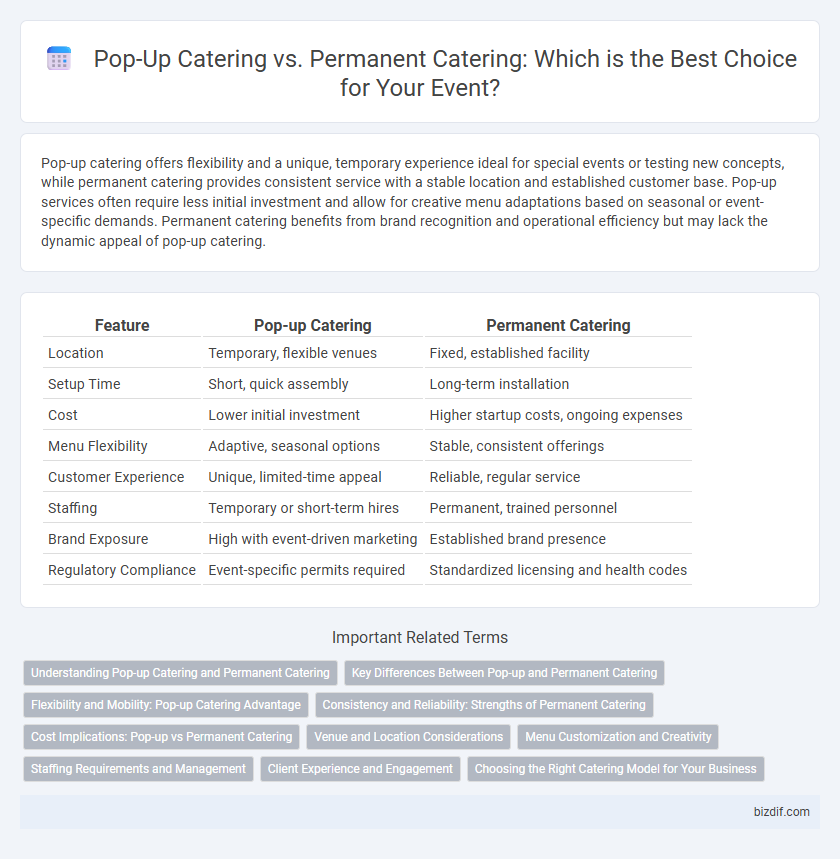Pop-up catering offers flexibility and a unique, temporary experience ideal for special events or testing new concepts, while permanent catering provides consistent service with a stable location and established customer base. Pop-up services often require less initial investment and allow for creative menu adaptations based on seasonal or event-specific demands. Permanent catering benefits from brand recognition and operational efficiency but may lack the dynamic appeal of pop-up catering.
Table of Comparison
| Feature | Pop-up Catering | Permanent Catering |
|---|---|---|
| Location | Temporary, flexible venues | Fixed, established facility |
| Setup Time | Short, quick assembly | Long-term installation |
| Cost | Lower initial investment | Higher startup costs, ongoing expenses |
| Menu Flexibility | Adaptive, seasonal options | Stable, consistent offerings |
| Customer Experience | Unique, limited-time appeal | Reliable, regular service |
| Staffing | Temporary or short-term hires | Permanent, trained personnel |
| Brand Exposure | High with event-driven marketing | Established brand presence |
| Regulatory Compliance | Event-specific permits required | Standardized licensing and health codes |
Understanding Pop-up Catering and Permanent Catering
Pop-up catering offers a flexible, temporary dining experience often set up for specific events or limited-time engagements, allowing caterers to experiment with unique menus and locations. Permanent catering operates from a fixed venue, providing consistent service and established infrastructure that supports large-scale and recurring events. Understanding these models helps businesses choose between the adaptability of pop-up catering and the reliability of permanent catering based on event goals and customer needs.
Key Differences Between Pop-up and Permanent Catering
Pop-up catering offers flexible, temporary event-based services ideal for testing new menus and locations, while permanent catering provides consistent, long-term solutions with established infrastructure. Pop-up catering tends to have lower overhead costs and limited space, focusing on innovation and exclusivity, whereas permanent catering benefits from dedicated kitchens, staff stability, and extensive resources. Client engagement in pop-up catering is often seasonal or event-specific, contrasting with permanent catering's ongoing partnerships and recurring service contracts.
Flexibility and Mobility: Pop-up Catering Advantage
Pop-up catering offers unparalleled flexibility and mobility, allowing caterers to easily set up at various locations for events ranging from corporate gatherings to outdoor festivals. Unlike permanent catering venues, pop-up services can adapt quickly to changing client needs and venue constraints without the limitations of fixed infrastructure. This dynamic approach enhances customer reach and provides tailored culinary experiences in diverse environments.
Consistency and Reliability: Strengths of Permanent Catering
Permanent catering services offer unmatched consistency and reliability due to their stable infrastructure, experienced staff, and established supply chains. Regular quality control measures and standardized processes ensure every event delivers a predictable high-quality dining experience. Unlike pop-up catering, permanent setups minimize risks related to menu fluctuations and service delays, making them ideal for clients demanding dependable culinary solutions.
Cost Implications: Pop-up vs Permanent Catering
Pop-up catering incurs lower initial costs due to minimal setup and temporary locations, making it ideal for short-term events and testing new markets. Permanent catering requires significant investment in a fixed kitchen, staff, and long-term leases, leading to higher operating expenses but offering consistent service and brand presence. Businesses must evaluate budget flexibility and revenue projections to determine the most cost-effective catering model.
Venue and Location Considerations
Pop-up catering offers flexibility by utilizing temporary venues like parks, rooftops, or event halls, making it ideal for unique locations and seasonal events. Permanent catering operations require a fixed venue with consistent infrastructure, ensuring reliable kitchen facilities and storage that support daily or frequent service. Selecting between pop-up and permanent catering depends heavily on the accessibility, capacity, and logistical suitability of the chosen location for the target audience.
Menu Customization and Creativity
Pop-up catering offers unparalleled menu customization and creativity by allowing chefs to design unique, event-specific dishes that reflect current culinary trends and client preferences. Permanent catering services typically provide standardized menus with limited flexibility, focusing on consistency and operational efficiency. Clients seeking innovative, bespoke dining experiences often prefer pop-up catering for its adaptability and inventive approach.
Staffing Requirements and Management
Pop-up catering demands flexible staffing models with temporary, versatile teams skilled in rapid setup and adaptability to diverse locations. Permanent catering operations require a consistent, trained workforce focused on long-term facility management, customer service, and routine operational efficiency. Effective management in pop-up catering prioritizes agility and real-time problem-solving, whereas permanent catering emphasizes sustained team development and standardized workflow optimization.
Client Experience and Engagement
Pop-up catering offers dynamic, immersive experiences that engage clients through novelty and flexible event customization, creating memorable interactions tailored to specific occasions. Permanent catering ensures consistent quality, personalized service, and a reliable environment, fostering long-term client relationships and trust. Both models prioritize client satisfaction but differ in approach, with pop-up catering excelling in spontaneous engagement and permanent catering emphasizing stability and personalized continuity.
Choosing the Right Catering Model for Your Business
Pop-up catering offers flexibility and lower startup costs, ideal for testing market demand and adapting quickly to different locations, while permanent catering provides stability, brand establishment, and consistent revenue through fixed venues. Evaluating factors such as target audience, budget, scalability, and long-term business goals is crucial when choosing between pop-up and permanent catering models. Businesses seeking rapid growth and brand experimentation benefit from pop-up catering, whereas those prioritizing established customer bases and reliable service environments should consider permanent catering.
Pop-up Catering vs Permanent Catering Infographic

 bizdif.com
bizdif.com